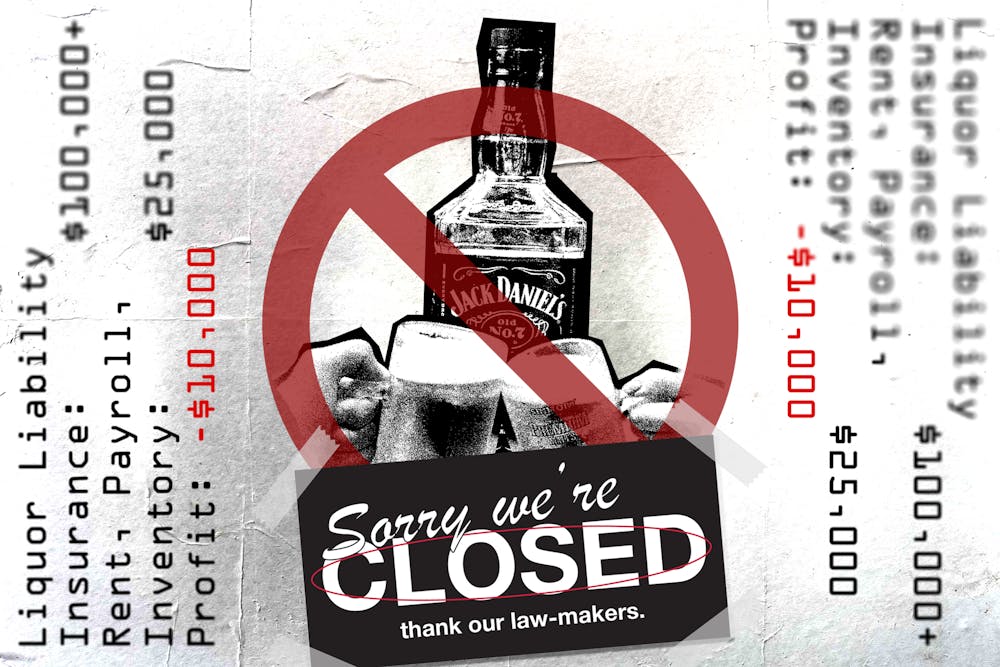The days of Five Points being a college staple for having a drink on Friday nights are disappearing, and we have one culprit to thank: South Carolina's asinine $1 million liquor liability insurance requirement. It's killing Columbia's nightlife while lawmakers sip their cocktails and pat themselves on the back for "reform" that won’t save a single struggling bar.
In 2017, state legislators passed a catastrophic law requiring any establishment serving alcohol after 5 p.m. to maintain $1 million in liquor liability coverage. The goal was to combat drunk driving.
The reality is that it is destroying the very fabric of our city's social and economic ecosystem. Making matters worse, South Carolina also doesn't allow businesses to self-insure for liquor liability, leaving them at the mercy of an ever-shrinking insurance market.
Insurance premiums have skyrocketed anywhere from 100% to 1,000% across the state. What cost $5,000 annually in 2020 can now run $100k+. For small businesses operating on razor-thin margins, that’s a death warrant.
And death is exactly what Columbia's nightlife is experiencing.
Walk through Five Points on a Thursday night, and you'll feel the ghost town beginning to emerge. The Woody on Main, Columbia's iconic dance bar, announced in September it would close following Halloween after fighting rising insurance costs for years.
Owner Chad Owens said in an interview with WACH-FOX, "We aren't making huge profits. So when that gets eaten into by these much higher rates, it's hard to justify the amount of work we're putting into it."
One of my favorite bars, Carolina Western Pub, a beloved country music venue in the Vista, shut its doors in May after opening in 2018. The Dales Biergarten and Bottle Shoppe in Springdale, just outside West Columbia, operated a little over two years before announcing that it would close on Oct. 17, 2025, also blaming the steep cost of liquor-liability insurance required under South Carolina law.
Even survivors are amputating limbs to stay alive. Bar None in Five Points, a mainstay for decades, cut its late-night hours in January, essentially surrendering the college crowd that kept it thriving for years.
And the hospitality industry is Columbia's economic backbone. The bars and nightclubs sector alone represents a $434.7 million market in South Carolina, and Columbia — as home to the state’s flagship university and the state capital — should be its beating heart. Instead, we're watching it flatline.
The ripple effects extend far beyond bar owners. Bartenders who once pulled $15+ hourly plus tips are watching shifts disappear. Musicians have lost venues. Food trucks that relied on late-night bar crowds are seeing revenue evaporate.
With a student body of over 40,000, the University of South Carolina now has fewer safe, regulated on-campus nightlife options as nearby bars and venues shut because of rising liquor-liability costs — and neighborhood leaders say that has pushed students into unsupervised house parties that they regularly complain about.
Lawmakers finally passed a reform bill in May 2025 that introduces joint and several liability, meaning bars won't automatically be held 100% responsible for drunk driving accidents they didn't directly cause.
But the law doesn't take effect until January 2026. For Dales Biergarten, that's four months too late. For Carolina Western Pub, it's eight months past their final song. For The Woody, it's a reprieve that arrived postmortem.
Nobody wants drunk drivers on our roads. The 2014 DUI crash that sparked this legislation was a tragedy. But punishing every bar for the actions of a few is collective punishment, not public policy.
The law's fundamental flaw is its joint and several liability standard — until the recent reform, bars could be held responsible for 100% of damages, even if they were only 1% at fault. Insurance companies, facing massive payouts, fled the state. Even the new reforms maintain a $300,000 minimum coverage, still crushing for small businesses.
The tension is already visible. Neighborhood leaders complain about student parties spilling into residential areas as bars close. City officials struggle to balance growth with quality of life. But you can't have it both ways; either provide regulated, taxable, safe venues for nightlife or watch chaos fill the void.

The outside of Jake’s Bar and Grill pictured on Nov. 13, 2025, in Columbia, South Carolina. The bar holds a “Yappy Hour” on Tuesdays and Thursdays where customers are encouraged to bring their dogs and get a tasty treat.
What’s needed is immediate emergency relief for struggling businesses. This includes retroactive premium subsidies to support those that managed to stay afloat through 2025. There must also be expedited implementation of the new liability standards, taking effect immediately rather than waiting until 2026.
Columbia's nightlife isn't just about drunk college kids. It's about community. It's about culture. It's about economic vitality. It's about having a city where people actually want to live, work and play.
The legislature has spent two years studying this crisis while businesses bled out. The reform they passed is a Band-Aid on a hemorrhage. By January 2026, how many more Woodys will we lose? How many more Carolina Western Pubs will play their final notes? How many more entrepreneurs will watch their dreams dissolve into bankruptcy paperwork?
This is our city. These are our neighbors. The $1 million rule isn't saving lives; it's killing Columbia, one last call at a time.
We need an actual solution, and we need it yesterday. Otherwise, Columbia's future will be written in the dust of empty bar stools and "Closed for Good" signs.

